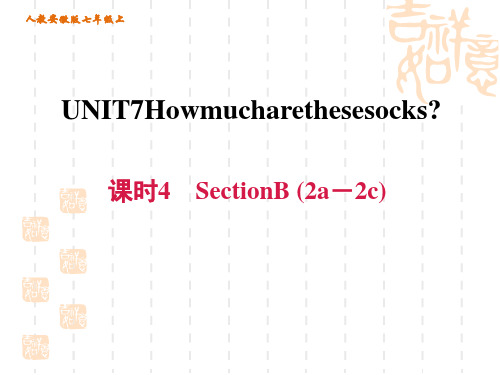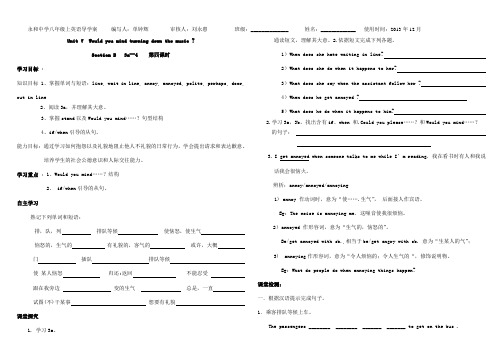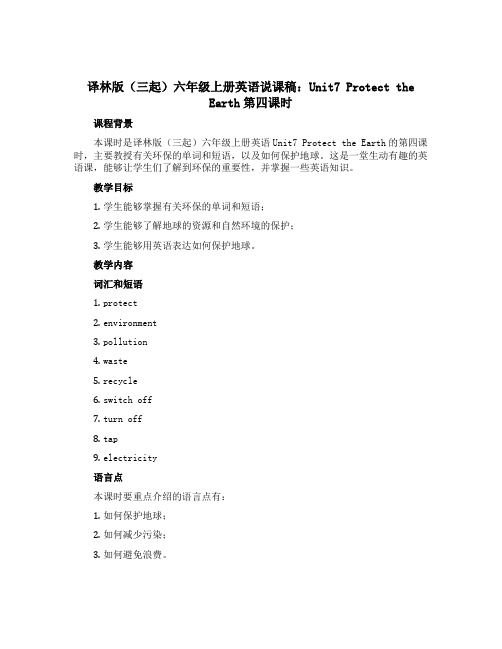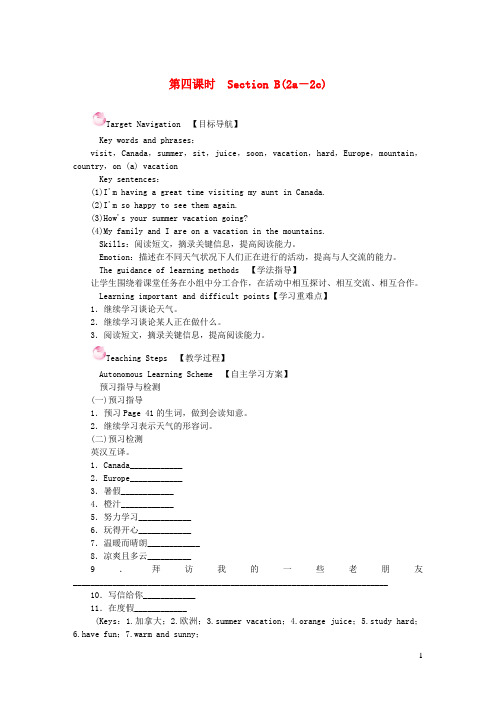Unit7第四课时
二年级英语上册 Unit 7 Weather 第四课时教案 沪教牛津版

一、主要新授内容(new contents)Let’s talk---Do you like…? Yes, I do. No, I don’t.二、学习目标(Objectives)1、结合生活实际中winter这个语言环境,用What can you see/wear/do? 来复习前几个教时中所学过的单词。
2、能熟练掌握句型Do you like…? Yes, I do. No, I don’t.并能结合学生已有的一些名词进行操练。
3、能运用已学句型做调查,进行自由交际,灵活运用。
三、教学建议1、任务前期准备阶段(Pre-task preparation section)Pre-task Preparation是指我们要求学生运用目的语(即所学的语言)之前,呈现给学生的新语言材料。
也就是我们常说的:Input。
在这个环节主要让学生获得对新语言材料的第一次感知。
Activity 1 (Letters)1、教学辅助(Aids)字母卡片2.活动过程(Process)Activity 2 Rhyme1、教学辅助(Aids)1)电脑(2A-U7-P3-3)(2A-U7-P3-4)2)屏幕2.活动过程(Process)Activity 3 (Ask and answer)1、教学辅助(Aids)1)电脑(2A-U7-P4-1)2)屏幕2.活动过程(Process)2、任务中期实施阶段(While-task procedure section)While-task Procedure,这是指语言技能的习得过程。
其中分为机械性操练和意义性操练两部分。
机械性操练可以让学生准确地模仿、复说新授的语言,让他们经过从模仿到识记的过程,使新知识由感知、理解、模仿直到储存。
在这个教学阶段也可以设计新授知识的二次或多次导入,并根据语言训练的需要设计相应的机械性操练和意义性操练。
在这种情况下,建议每项Activity形式尽可能不同,时间不要长,一个活动紧接着一个活动,容易抓住学生的注意力,维持学习兴趣。
人教版七年级上册英语UNIT 7 socks 习题课件 课时4 Section B (2a-2c)

三、根据汉语意思完成下面的句子,每空一词。 21. 请来和我们一起吃午饭吧。
Please_____________________lunchwithus. comeandeat/have
22. 他们卖的所有的书的价格都很优惠。 Theysellallthebooks________a_t_v_e_ry_g_o_o_d__p_r_ic_e_s_.
()4B3. Theteacherneeds_____. A. tenwhiteskirtsB. eightyellowskirts C. sevenblackskirtsD. fivegreenskirts
【点拨】原句为:“Howmuchisit?” “Only10dollars,” saysLisa. “Oh, it’sreallycheap!”
四、完形填空。
Hello,
IamJohn.
Iam12.
Ineedtobuysome26_____formyfamily.
SoI27_____toAnn’sClothesStore.
Nowtheclothesatthestore28_____onsale.
()26. A. fruitB. vegetablesC. clothesD. books C
A. is; isB. are; are C. is; areD. are; is
()1B5. Susanhastwo_____. Shelikesthemverymuch. A. niceredskirtB. niceredskirts C. redniceskirtD. redniceskirts
【点拨】由two可知, 横线上用skirt的复数形式; 描 绘性形容词和表示颜色的形容词同时修饰一个名 词时, 描绘性形容词要放在表示颜色的形容词前。
Unit 7 第四课时

Unit 7 Would you mind turning down the music ?Section B 3a--4 第四课时学习目标:知识目标 1、掌握单词与短语:line, wait in line, annoy, annoyed, polite, perhaps, door, cut in line2、阅读3a,并理解其大意。
3、掌握stand以及Would you mind……?句型结构4、if/when引导的从句。
能力目标:通过学习如何抱怨以及礼貌地阻止他人不礼貌的日常行为,学会提出请求和表达歉意。
培养学生的社会公德意识和人际交往能力。
学习重点:1、Would you mind……?结构2、 if/when引导的从句。
自主学习熟记下列单词和短语:排,队,列排队等候使恼怒,使生气恼怒的,生气的有礼貌的,客气的或许,大概门插队排队等候使某人恼怒归还;返回不能忍受跟在我旁边变的生气总是,一直试图(不)干某事想要有礼貌课堂探究1. 学习3a。
通读短文,理解其大意。
2.依据短文完成下列各题。
1)When does she hate waiting in line?2)What does she do when it happens to her?3)What does she say when the assistant follow her ?4)When does he get annoyed ?5)What does he do when it happens to him?2.学习3a,3b,找出含有if、when 和.Could you please……?和Would you mind……?的句子:3.I get annoyed when someone talks to me while I’m reading. 我在看书时有人和我说话我会很恼火。
辨析:annoy/annoyed/annoying1)annoy 作动词时,意为“使…….生气”,后面接人作宾语。
译林版(三起)六年级上册英语说课稿:Unit7 Protect the Earth第四课时

译林版(三起)六年级上册英语说课稿:Unit7 Protect theEarth第四课时课程背景本课时是译林版(三起)六年级上册英语Unit7 Protect the Earth的第四课时,主要教授有关环保的单词和短语,以及如何保护地球。
这是一堂生动有趣的英语课,能够让学生们了解到环保的重要性,并掌握一些英语知识。
教学目标1.学生能够掌握有关环保的单词和短语;2.学生能够了解地球的资源和自然环境的保护;3.学生能够用英语表达如何保护地球。
教学内容词汇和短语1.protect2.environment3.pollution4.waste5.recycle6.switch off7.turn off8.tap9.electricity语言点本课时要重点介绍的语言点有:1.如何保护地球;2.如何减少污染;3.如何避免浪费。
学习方法在本课中,我们将采用多种教学方法:1.听力练习;2.交际对话;3.讨论和解决问题;4.视频播放;5.群体合作抽象概念。
教学步骤本课的教学步骤如下:1.预热:引出环保话题,了解学生对环保的认识;2.学生互动:通过小组讨论,了解学生们在日常生活中如何保护地球;3.视频播放:播放有关资源和自然环境保护的视频,让学生们更直观地了解环保重要性;4.环保单词与短语介绍:让学生们学习有关保护地球的单词和短语;5.角色扮演: 学生们以小组为单位,运用所学单词和短语,表演如何保护环境;6.总结:回归教学目标,总结教学内容,巩固所学知识。
课堂互动1.引导学生讨论在日常生活中如何保护地球;2.让学生小组合作,设计一套能够节约能量的方案;3.观看视频后,进行听力测试。
教学评价1.通过小组讨论,了解学生们的环保意识;2.观看学生角色扮演表演情况,了解学生对环保知识的掌握程度;3.课后布置作业,检查学生对本课所学内容掌握情况。
教学资源1.课件:PPT;2.视频资源:有关保护地球的短片;3.学生自带的纸笔。
陕旅版英语六年级上册 1Unit 7 第四课时

2. She
(like/likes)to draw pictures.
3. He likes to
(play/plays)games.
4. Sam
(get/gets)up at seven every day.
5.
(In/On)the morning, we have English and Chinese.
( B )3. 星期二 A. Monday B. Tuesday
( C )4. 有
A. do
( B )5. 照片 A. paper
B. be B. picture
C. tomorrow C. dry C. Wednesday C. have C. draw
1. What do you do (in/on)Monday morning?
Unit 7 It's Tuesday
Part B Let’s sing Part C Talk about Jimmy’s afternoon tea &
Put the words in order and write
Monday Tuesday
Wednesday
week
星期单词
Thursday Friday Saturday Sunday
Let’s sing
Good to know
新单词 缩写 Monday Tuesday Wednesday T Wed. Thur. Fri.
星期一 星期二 星期三 星期四 星期五
重点句型
— What does Jimmy have on Monday? 吉米星期一吃什么? — He has …他吃……
我们吃面包、蔬菜和鱼肉。
准格尔旗X中学七年级英语下册Unit7It'sraining第四课时SectionB2a_2c教案新

第四课时Section B(2a-2c)Target Navigation 【目标导航】Key words and phrases:visit,Canada,summer,sit,juice,soon,vacation,hard,Europe,mountain,country,on (a) vacationKey sentences:(1)I'm having a great time visiting my aunt in Canada.(2)I'm so happy to see them again.(3)How's your summer vacation going?(4)My family and I are on a vacation in the mountains.Skills:阅读短文,摘录关键信息,提高阅读能力。
Emotion:描述在不同天气状况下人们正在进行的活动,提高与人交流的能力。
The guidance of learning methods 【学法指导】让学生围绕着课堂任务在小组中分工合作,在活动中相互探讨、相互交流、相互合作。
Learning important and difficult points【学习重难点】1.继续学习谈论天气。
2.继续学习谈论某人正在做什么。
3.阅读短文,摘录关键信息,提高阅读能力。
Teaching Steps 【教学过程】Autonomous Learning Scheme 【自主学习方案】预习指导与检测(一)预习指导1.预习Page 41的生词,做到会读知意。
2.继续学习表示天气的形容词。
(二)预习检测英汉互译。
1.Canada____________2.Europe____________3.暑假____________4.橙汁____________5.努力学习____________6.玩得开心____________7.温暖而晴朗____________8.凉爽且多云__________9.拜访我的一些老朋友________________________________________________________________________ 10.写信给你____________11.在度假____________(Keys:1.加拿大;2.欧洲;3.summer vacation;4.orange juice;5.study hard;6.have fun;7.warm and sunny;8.cool and cloudy;9.visit some of my old friends;10.write to you;11.on a vacation)Classroom Learning Guidance Scheme 【课堂导学案】【探究一】1.Look at the pictures in 2a.Talk about the pictures in pairs.Finish 2a.2.Look at the postcards in 2b.Guess what they are talking about.3.Read through the postcards quickly.Finish 2c.4.Check the answers.【探究二】Pair workTalk about your own summer vacation according to the chart in 2c.【探究三】合作交流。
译林英语四下教案Unit 7 What's the matter 第四课时

译林英语四下教案Unit 7 What’s the matter 第四课时教材分析本节课是译林英语四下Unit 7 What’s the matter的第四课时。
本节课的主要内容是针对学生生活中遇到的问题进行交流和表达,让学生学会用英语表达自己的困难和问题,并能够听取和提供帮助。
本课时的教学目标是:•通过听读课文,让学生学会用英语表达自己遇到的问题。
•让学生学会向他人提供帮助,鼓励学生在生活中互相帮助。
•通过课堂游戏和小组讨论,让学生积极参与课堂互动,提高学生听说能力和应变能力。
教学重点1.学会用英语表达自己遇到的问题。
2.学会向他人提供帮助。
教学难点1.如何在不熟悉的情况下向他人提供帮助。
2.如何巧妙地表达自己的问题,避免造成误解。
教学准备1.教师备好教案、课件、教材、音频设备。
2.学生在听、说方面的教学材料。
3.班级实际情况的调查材料。
4.外教参加课堂。
教学过程Step 1 自我介绍教师和学生自我介绍,介绍自己的兴趣爱好、想要学的东西和遇到的问题。
Step 2 预习课文让学生通过阅读课文,从中找出有关问题表达和帮助提供的句子和语言点,并带领学生朗读和模仿。
Step 3 课文梳理让学生回答下列问题:1.What’s the matter with Linda?2.What can Tony do to help her?3.What’s the problem of John?4.How can Lucy help John?通过学生回答问题的形式让学生加深对课文的理解和记忆。
Step 4 游戏环节以班级或小组为单位,做一个小游戏。
老师会在板书上写下一件状况,比如:在公交车上手提包掉地上了,这时学生们就要找到一个帮助解决这个问题的反应和答案。
Step 5 小组讨论将班级分成若干小组,让每个小组选择一个成员来介绍自己的问题。
然后其它小组成员给出建议和帮助解决问题。
每个小组需要在5分钟内完成讨论。
学案3:Unit 7 第四课时

Teenager should be allowed to choose their own clothes.Section B 1a-2e ( Period 4 )1.通过听力和合作学习,进一步掌握含有情态动词的被动语态。
2.学会用英语表达我们应该遵守的校规校纪。
3.学会理解校规校纪,培养自己模范遵守各项规章制度的优良品质。
4.通过阅读和合作学习,进一步掌握含有情态动词的被动语态。
5.学会用英语表达自己的意愿,并坚持自己的梦想。
6.学会处理好学业和爱好之间的关系,并能接受老师和家人的合理化建议。
【自主学习案】学法指导:认真复习本单元已学单词和短语,准备课前听写。
I. 1a. Read the questions. How often do you do these things? Write A for always, U for usually, S for sometimes and N for never.Do you ever...1. get to class late? ______2. study with friends? ______3. finish a test early? ______4. worry about failing a test? ______5. …II. Speaking1b. Talk about your answers in la.A: Do you ever get to class late?B: Yes, I sometimes get to class late.III. Listening1c. Listen and circle the things in la that Peter talks about.Do you ever...1. get to class late?2. study with friends?3. finish a test early?4. worry about failing a test?5. …1d. Listen again. Match these sentence parts.1. Peter is going to ... ___2. He isn't allowed to ... ___3. Peter wasn't allowed to... ___4. He could ... ___5. He should be allowed to ___a. take the test.b. pass the test.c. fail a math test.d. take the test later.e. get to class late.IV. Discussion1e. Read the statements. Then discuss them with your group.1. Peter should be allowed to take the test later.2. Students need strict rules.3. Parents should not be too strict with teenagers.A: I think Peter should...B: I don't agree.C: I think...e.g.A: I think Peter should be allowed to take the test later.B: I don't agree.C: I think students need strict rules.A: It’s not fair if they don’t even give him a chance.B: The school has to have rules.C: But if he explains what happened, the teacher will understand.2a. Discuss the questions in your group.Are you allowed to make your own decisions at home? What kinds of decisions? V. Think about it1. What’s your hobby?2. Do you think hobby can get in the way of schoolwork?VI. Reading2b. First, look at the title of the passage. Answer "yes" or "no". Find out how many in your group agree with you. Then read the passage. Does your answer change?2c. Read the passage again and answer the questions.1. What is Liu Yu’s hobby?2. What does Liu Yu want to be when he grows up?3. Why do Liu Yu’s parents not allow Liu Yu to practice his hobby at night?4. Do you think Liu Yu should be allowed to practice his hobby as much as he wants? Why orwhy not?Read the passage again and fill in the chart.VII. Language points1. But sometimes these can get in the way of their schoolwork …get in the way of 挡……的路;妨碍e.g. Computer games will get in the way of his study.电脑游戏会影响他的学习2. My wife and I have supported every one of his races.support v .& n.支持e.g. I hope you will support me in my efforts to discover the truth.在我努力寻求揭发真相时,希望你能帮助我。
- 1、下载文档前请自行甄别文档内容的完整性,平台不提供额外的编辑、内容补充、找答案等附加服务。
- 2、"仅部分预览"的文档,不可在线预览部分如存在完整性等问题,可反馈申请退款(可完整预览的文档不适用该条件!)。
- 3、如文档侵犯您的权益,请联系客服反馈,我们会尽快为您处理(人工客服工作时间:9:00-18:30)。
12. government n.政府
1. Compare facts about these two animals. Use the language in the box to help you make sentences.
1.New words : bamboo, research , awake , excitement, illness, adult , remain, artwork, wild , government2.Important notes : baby pandas, adult pandas, panda keepers , run over with , fall over, play with, take care of ,every two years , spend…dong , cut down, send…to, in the future 3.Understandingthearticle
教学
难点
难点
1.New words and expressions
2.To improvethereading skills
解决办法
Listen , speak, read ,practice
教学资源
Multimedia, English book , PPT
板书设计
Unit7 What’s the highest mountain in the world ?
Step 8 Homework
1. weigh v.称重2. adult n.成人adj.成年的3. bamboo n.竹子
4. endangered adj.濒危的5. research n.&v.调查;研究
6. keeper n.饲养员7. awake adj.醒着8. excitement n.激动
1.New words : bamboo, research , awake , excitement, illness, adult , remain, artwork, wild , government2. Important notes : baby pandas, adult pandas, panda keepers , run over with , fall over, play with, take care of ,every two years , spend …dong , cut down, send …to, in the future
教学目标
知识与技能
1.Improve listening ability
2.Know about the features and habits of pandas and generate the ideas to protecttherare animals.
过程与方法
Let the students with reading, reading is an important part of the teaching, is the key to understanding the students grasp the contents of the text. On the basis of the students answer all kinds of questions, students can be asked to analyze each paragraph, analyze the main idea of each paragraph, at the same time, explain and discuss the syntax and grammar.
e.g. This elephant weighs many times more than this panda.
(200 cm taller/shorter, weigh much more/less, eat much more/less, eat many times more)
教学过程设计(第 4 课时)
教学环节
教师活动
学生活动
教学媒体
预期效果
Step 1 New words
Step 2 Discussion
Step 3 Listening
Step 4 Discussion
Step 5 Reading
Step 6 Language points
Step 7 Summary
课堂教学设计
课题:Unit7 What’s the highest mountain in the world ?授课时数:1课时
日期:2016年5月日
年级:八年级单位:八十六团第一中学授课教师:白枚青
设计要素
设计内容
教学内容分析
1、The teaching content of this course is to teach eight grade English version of volume seventh units of fourth hours. The main content of this lesson is about rare animals Panda reading teaching, first by skipping to improve the students' ability of fast reading, the text to basic understanding. On the basis of understanding the text, students are required to carry out the text.
情感态度价值观
Protect animals a
About reading , some students are afraid to do. Because they can’t master their meanings and use them.
教学分析
教学重点
